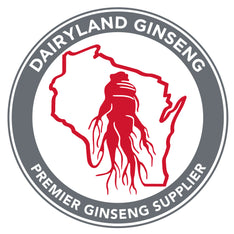
Your Complete Guide to Ginseng Dosage
American Ginseng Dosage & Usage Guide
General Dosage & Forms
What is the recommended daily dosage of American ginseng?
For general wellness, the ideal dosage varies by the form of ginseng you choose. While individual needs differ, research suggests the following daily guidelines:
-
Capsules: 500 mg – 2,000 mg (typically divided into two doses).
-
Whole Roots/Slices: 1 – 2 grams (chewed or steeped).
-
Tea: 1 – 2 grams of root per cup (1–2 cups daily).
-
Liquid Extract: 100 – 400 mg (highly concentrated; follow bottle instructions).
Note: American ginseng is milder than Asian varieties (Panax), making it suitable for daily use. However, experts recommend cycling your intake (e.g., taking it for 2–3 weeks, then taking a week off) to maintain effectiveness.
How does the dosage differ between roots, capsules, and extracts?
Because concentration levels vary, the physical amount you consume depends on the form. Refer to this quick comparison:
| Form | Typical Daily Dose | Best For... |
| Capsules | 2–4 capsules (500mg each) | Convenience and precise, consistent dosing. |
| Whole Roots | 1–2 grams | Traditional use; getting the full spectrum of compounds. |
| Tea | 1–2 cups | A gentle, soothing, and sustained dose. |
| Extracts | 100–400 mg | Potency; strictly follow manufacturer instructions. |
| Powder | 500–1,000 mg (¼ to ½ tsp) | Mixing into smoothies or foods. |
Targeted Health Benefits
How much ginseng should I take for energy and fatigue?
To combat tiredness and boost stamina without the "jitters" of caffeine, a dosage of 1,000 – 2,000 mg daily is recommended. Taking this in the morning can provide sustained energy throughout the day.
What is the correct dosage for blood sugar management?
Studies suggest taking 3 grams of American ginseng up to 2 hours before a meal may help regulate post-meal glucose levels.
> Important: If you are currently on diabetes medication, consult your doctor before adding ginseng to your routine to avoid hypoglycemia.
Can ginseng help with focus and anxiety?
Yes. The adaptogenic properties of ginseng support cognitive function and stress relief.
-
For Brain Fog/Memory: 200–400 mg of extract or 1–2 grams of root.
-
For Stress/Anxiety: 500–1,000 mg daily to promote calm while maintaining alertness.
Timing & Results
When is the best time of day to take ginseng?
-
Morning: Best for maximizing energy and focus.
-
Before Meals: Best if taking it for blood sugar control (30–60 minutes prior).
-
Avoid Evenings: Ginseng can be stimulating. To prevent insomnia, aim to finish your daily dose by mid-afternoon.
How long does it take for ginseng to work?
-
Immediate (Hours): You may feel increased alertness and energy shortly after a high dose or extract.
-
Short-term (1–2 Weeks): Improvements in stress levels and mental clarity usually appear.
-
Long-term (4–8 Weeks): Full adaptogenic benefits, immune support, and blood sugar regulation require consistent use.
Safety, Risks & Interactions
Is it safe to take ginseng every day?
American ginseng is generally safe for daily use, provided you stay within recommended limits. Most experts advise not exceeding 3,000 mg per day, as higher doses do not increase benefits and may cause side effects.
What are the side effects of taking too much ginseng?
Excessive consumption can lead to:
-
Insomnia or sleep disturbances
-
Headaches
-
Digestive issues (nausea/diarrhea)
-
Rapid heartbeat or blood pressure changes
-
Nervousness
Who should avoid taking ginseng?
You should exercise caution or avoid ginseng if you fall into these categories:
-
Pregnant/Breastfeeding: Safety has not been established.
-
Children: Not recommended for those under 18 without medical supervision.
-
Autoimmune Conditions: Ginseng stimulates the immune system and may worsen conditions like lupus or rheumatoid arthritis.
Does ginseng interact with medications?
Yes, ginseng can have serious interactions with specific drug classes:
-
Blood Thinners (e.g., Warfarin): May reduce effectiveness and increase clot risk.
-
Diabetes Medications: May cause blood sugar to drop too low (hypoglycemia).
-
MAOIs (Antidepressants): May cause headaches, tremors, or mania.
-
Immunosuppressants: May counteract the medication.
-
Stimulants (Caffeine/ADHD meds): May amplify effects, leading to jitteriness or heart palpitations.
Always consult your healthcare provider before combining ginseng with prescription medications.
Ready to incorporate American Ginseng into your routine?
Start with a high-quality product to ensure safety and potency. Explore premium roots, teas, and capsules at Dairyland Ginseng.

Leave a comment